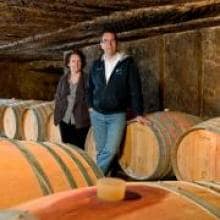Château Lamothe de Haux

Sustainably Producing Premium Grapes for Great Wines
Damien Chombart, manager of Châteaux Lamothe de Haux, devotes a large part of his time to marketing his wines for export. He knows that his customers are very attentive to the respect of the environment in the management of the vines. Châteaux Lamothe de Haux is close to the Bordeaux metropolis. The inhabitants of the surrounding villages enjoy living in the vineyards and do not want nuisances. All actions implemented on the farm are in line with respect for the environment and the protection of employees. For example, the entire vineyard has been grassed between the rows of vines since the 1980s. This limits erosion and improves wine quality; however, the grass and weeds can compete with the vines for nutrients. To limit this the grass is frequently mowed and the bottom area of the vines is weeded. A special relationship has been established with the neighboring beekeepers to inform each other on upcoming vineyard and bee activities allowing the bees to safely collect nectar and pollen.
Damien Chombart strives to demonstrate that viable viticulture and winemaking can advance side by side with respect for the environment and people.
-
Location: Haux, near Bordeaux, France
-
History: Château Lamothe’s foundations date back to the 16th century. Since 1956, 4 generations of the family have managed Château Lamothe: the Perriquets, then the Néels, and now the Chombarts.
-
Farm size: 75 hectares
-
Primary crops: Wine Grapes
-
Notable partnerships: Berthoud, French Vine, and Wine Institute, Vitinnov, beekeeper

Datengesteuerte Entscheidungen zum Schutz des Weinbergs
Tools zur Unterstützung des bestmöglichen Pflanzenschutzes sind auf Château Lamothe gut etabliert. Über Movida®, ein Tool zur Eindämmung von Mehltau in Weinbergen, das mit lokalen Wetterstationen verlinkt ist, können die Winzer ein epidemiologisches Modell für Falschen Mehltau und Echten Mehltau sowie ein Wachstumsmodell für das Weingut entwickeln. Dieses System spart nicht nur Zeit und Geld, sondern unterstützt auch die Nachhaltigkeitsziele des Weinguts durch maßgeschneiderte Empfehlungen für eine effektive Krankheitsbekämpfung mit minimaler Umweltbelastung.
Kontakt:
Pierre Yves Yeme: pierreyves.yeme@bayer






















